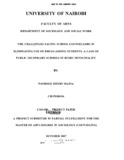| dc.description.abstract | The use of drugs among youth in Kenya is a main concern to the society and if measures
are not taken to prevent the trend at which the usage is moving, there one can predict that,
the future for the young people will be doomed. The government has formulated policies
to minimize use of drugs which have not been very fruitful. Some of the measures put for
the prevention are designed to restrict the youth from taking legalized drugs. For instance
the government restrict bar operators from selling any form of liquor to the people under
18 years of age by demanding the youth to produce identity cards in case one is doubting
the age of the person seeking to be served for beer.
In schools traditional methods have been used to discipline students who are deviant but
it was realized that, such measures especially canning hardens the students which
promotes more deviance. In an attempt to solve this problem, the government introduced
guidance and counselling as a way of preparing them to be responsible future citizens.
In response to this, this study was conducted to find out the effect of counselling in
reducing use of drugs among students.
The study was guided by the following objectives namely;
To establish the factors that influence secondary school students to use drugs
To identify the type of interventions used by school counsellors to sensitize students
against drug use
To find out the response of secondary school students to counselling in reducing use of
drugs
To establish the constraints faced by school counsellors in their efforts to influence
students to stop using drugs
Three theories were used to explain the study namely, observation learning theory, social
exchange theory and deviant theory. The total number of respondents were 97 who
included 38 girls, 53 girls, 2 male head teachers, 1 female head teacher two female
counsellors and 1 male counselor.
v
The data was collected from the students and key informants who were head teachers and
school counsellors. Data analysis was done by use of Microsoft office 2003.
Descriptive statistics was used to discuss the results of the study whereby the responses
were tabulated by use of frequency tables and percentages. The researcher drew
inferences where deductions were derived from statistical observations.
From the above objectives it was revealed that, the reasons why students indulge in drugs
is due to peer influence, curiosity, relating with friends, easy availability of certain drugs,
to concentrate in studies etc. It was also revealed that, due to high prevalent of drug use
among students, schools have prioritized counseling focusing on drug use and therefore,
counsellors have attempted to address the problem by using professional approaches that
include, psychodrama, group counselling, bibliocounselling and individual counselling.
There was an indication of positive response of students who had been found with drug
related cases. The study revealed that, after being found with drug related cases, school
administration refer students to counsellors who take them counselling process. However,
counsellors face a lot of challenges in addressing the problem of drugs which include,
lack of sufficient information on drugs, defensive parents, lack of proper guidelines from
the Ministry of Education on how to conduct counselling and limited time for counselling
due to academic workload. >
Based on the findings, the researcher concluded that, the prevalent of drug use in
secondary schools in still high. The government effort to address the problem through
counselling has partially borne some fruits considering that, some students have changes
their behaviour and abandoned drugs. However, it was also found that counselling tool
has to be supplemented with the traditional methods of instilling discipline to students
and especially canning. This is because the students also admitted that, before being
taken to a counsellor for drug disciplinary cases they are either punished or canned and
sometimes it was not possible to tell whether the effect for change of behaviour was as a
result of counselling or other disciplinary measures the precede or supersede counselling.
vi
This study recommended that, due to shortage of teachers and excessive workload for
counsellors, the government should consider to engage full time counsellors instead of
appointing teachers as counsellors. The Ministry of Education should also punish
sufficient manuals with comprehensive coverage on wide range of topics based on the
needs of the students including drug use. | en_US |



